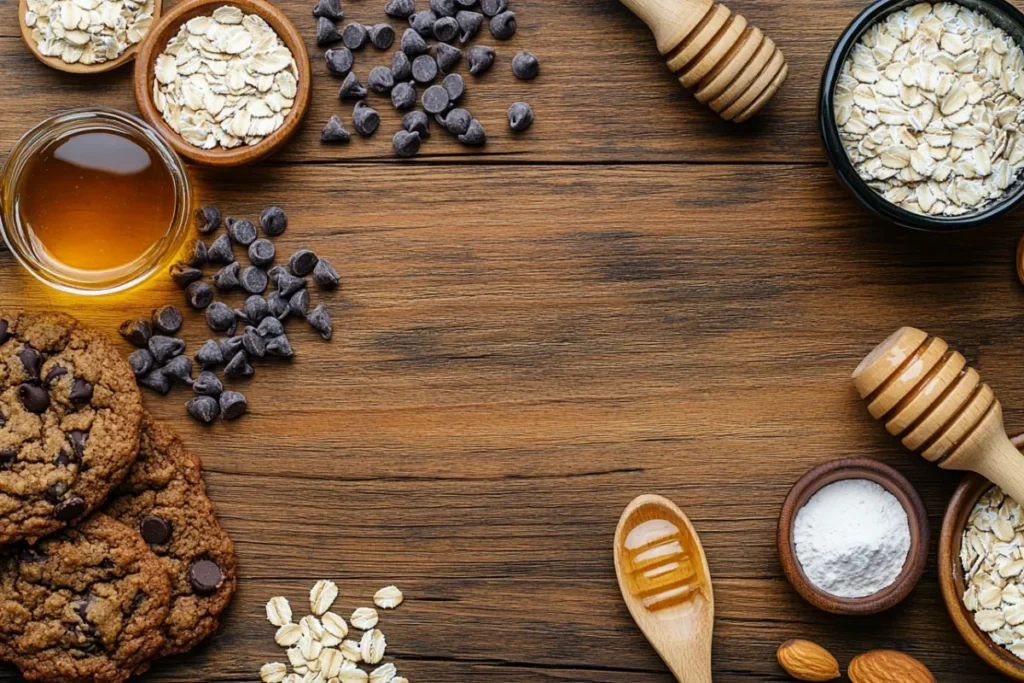Protein cookies are all the rage these days, but are they really as healthy as they’re hyped up to be? Whether you’re a gym enthusiast, a busy professional, or just someone searching for better snack options, understanding the pros and cons of protein cookies is essential. This article explores their ingredients, nutritional value, health benefits, potential drawbacks, and much more. By the end, you’ll be equipped to decide if protein cookies deserve a spot in your diet!
What Are Protein Cookies?
Protein cookies are specially crafted snacks that combine the appeal of traditional cookies with a boost of protein content. Unlike regular cookies, these treats aim to satisfy your sweet tooth while supporting your dietary goals.
What sets them apart? Protein cookies typically include high-protein ingredients like whey or plant-based protein powders, almond or peanut butter, and even oats or seeds. They are designed to provide a balance of macronutrients, making them a popular option for fitness enthusiasts and people looking for healthier snack alternatives.
But wait, they’re not all created equal! The market is flooded with store-bought protein cookies, which often come with added sugars and preservatives. On the flip side, homemade protein cookies allow greater control over ingredients, ensuring a cleaner and healthier choice.
In this article, we’ll break down the exact nutritional content, discuss their pros and cons, and provide tips for choosing the best protein cookies. Keep reading to find out if these snacks are truly healthy or just cleverly marketed indulgences.

Understanding Protein Cookies
Ingredients in Protein Cookies
Protein cookies vary widely in their ingredients, but there are common staples that you’ll find across most varieties. These ingredients directly influence whether protein cookies are a healthy choice or not.
- Protein Sources: Most protein cookies contain whey protein, casein, or plant-based options like pea protein or soy protein. These provide the high-protein content that sets these cookies apart.
- Carbohydrates: Oats, almond flour, and coconut flour are often used as healthier carb sources. However, some store-bought options may include refined flours.
- Fats: Nut butters, coconut oil, or even MCT oil are common fats found in these cookies, offering satiety and energy.
- Sweeteners: Many protein cookies use artificial sweeteners like sucralose or stevia to reduce sugar content. However, some also sneak in hidden sugars.
- Additives and Preservatives: Store-bought options often include preservatives and stabilizers to enhance shelf life, which could impact their health benefits.
Homemade protein cookies, however, give you the freedom to choose all-natural ingredients, ensuring a cleaner, healthier treat.
Nutritional Profile of Protein Cookies
When comparing protein cookies to regular cookies, the nutritional profile stands out. Here’s what you can expect from a typical protein cookie:
- Protein Content: Protein cookies pack between 10-20g of protein per serving, supporting muscle repair and growth.
- Calorie Count: A protein cookie usually contains between 200-400 calories, depending on size and ingredients. While higher than regular cookies, the protein-rich profile makes them more satiating.
- Carbs and Fats: These cookies aim for a balance between carbohydrates and healthy fats. However, be cautious of those with hidden sugars that could spike your calorie intake.
- Sugar Content: Many protein cookies advertise themselves as low-sugar, but some brands include artificial sweeteners, which might not always be the healthier choice.
How to Interpret Labels: Not all protein cookies are as healthy as they appear. Always read the nutrition label carefully. Look for cookies with minimal sugar content, high protein, and healthy fat sources, avoiding ones packed with preservatives or artificial ingredients.
Health Benefits of Protein Cookies
High Protein Content
Protein cookies shine when it comes to delivering a solid dose of protein, making them a favorite among fitness enthusiasts. Protein is essential for:
- Muscle Repair and Growth: After an intense workout, consuming a protein cookie can help repair muscle fibers and promote growth.
- Sustained Energy: Protein slows down digestion, ensuring a longer-lasting energy boost compared to sugary snacks.
- Appetite Control: High-protein snacks like these help curb hunger, reducing the temptation to overeat or reach for less healthy options.
Whether you’re on the go or need a quick post-workout fix, these cookies can serve as a convenient protein source.
Convenience for a Quick Snack
Let’s face it—busy schedules often lead to unhealthy eating habits. Protein cookies offer a portable, pre-packaged snack option that’s easy to toss in your bag. Unlike traditional cookies that deliver empty calories, protein cookies combine indulgence with nourishment.
For example, a protein cookie with oats and almond butter provides fiber and healthy fats in addition to protein, making it a more balanced option than vending machine snacks. Plus, they’re shelf-stable, so you can stock up without worrying about spoilage.
Alternative to Sugary Snacks
Protein cookies can be a lifesaver when you’re battling sugar cravings. Their naturally sweetened or low-sugar formulas satisfy your sweet tooth without wreaking havoc on your diet. Here’s why they’re a better option:
- Controlled Sugar Content: Many protein cookies use natural sweeteners like honey or stevia.
- Satiety Factor: Thanks to their high protein content, these cookies keep you full longer, preventing binge eating.
- Weight Management: By replacing traditional sweets with protein cookies, you may find it easier to stick to a calorie-controlled diet.
However, moderation is key—too much of a good thing can still lead to overconsumption.
Potential Drawbacks of Protein Cookies
Added Sugars and Artificial Ingredients
While protein cookies are marketed as healthy snacks, some store-bought varieties can be packed with unwanted extras. Here are the common culprits:
- Hidden Sugars: Despite claims of being “low sugar,” many protein cookies contain hidden sugars in the form of syrups or sugar alcohols, which can spike blood sugar levels or cause digestive issues.
- Artificial Flavors and Preservatives: These ingredients help with shelf life and taste but might have potential side effects, including allergies or stomach discomfort.
- Artificial Sweeteners: While they lower calorie content, excessive consumption of sweeteners like sucralose or aspartame may affect gut health.
Always check the ingredient list and opt for protein cookies with simple, recognizable ingredients.
Calorie Density
Protein cookies may be marketed as a healthy snack, but they can be surprisingly calorie-dense. Here’s why you should keep an eye on portion sizes:
- Higher Fat Content: Ingredients like nut butter and coconut oil add healthy fats, but they also increase calorie counts.
- Large Serving Sizes: Some cookies are marketed as a “single serving” but pack 300-400 calories—nearly a small meal!
If weight management is your goal, balance your consumption by pairing protein cookies with lower-calorie snacks like fresh fruits or veggies.
Misleading Marketing Claims
The health food industry often markets protein cookies with buzzwords like “clean,” “keto-friendly,” or “low carb.” While these terms sound promising, they don’t always guarantee a healthier product. Misleading claims can include:
- “High Protein” Labels: Some cookies may have less than 10g of protein, which doesn’t justify the high calorie or sugar content.
- “Natural Ingredients” Claims: Even cookies with natural ingredients can be loaded with sugar or unhealthy fats.
- “Sugar-Free” Confusion: Sugar-free doesn’t mean calorie-free—watch out for high-calorie sweeteners.
Pro Tip: Read between the lines. Focus on actual nutrition facts rather than buzzwords on the packaging.
Comparing Protein Cookies with Alternatives
Protein Bars vs. Protein Cookies
Protein bars and protein cookies are often pitted against each other as convenient, high-protein snacks. But how do they stack up nutritionally and practically?
- Protein Content: Protein bars usually contain higher protein levels (15–25g per serving) compared to protein cookies (10–20g per serving).
- Texture and Taste: Protein cookies often win in taste, offering a more indulgent texture, while protein bars can sometimes feel dense or chalky.
- Ingredients: Protein bars may have fewer natural ingredients, leaning heavily on artificial additives. Protein cookies, especially homemade ones, can be made with wholesome components like almond flour and natural sweeteners.
- Calorie Count: Cookies tend to be higher in calories, making bars the better option if calorie control is your goal.
Both options have their place, but the choice ultimately depends on your nutritional priorities and taste preferences.
Homemade Protein Cookies vs. Store-Bought
Making protein cookies at home offers significant advantages over store-bought options:
- Ingredient Control: Homemade cookies allow you to avoid artificial sweeteners, preservatives, and hidden sugars. You can customize them with your preferred protein sources, like whey or pea protein.
- Healthier Sweeteners: Use natural options like honey, dates, or stevia to keep sugar levels in check.
- Cost-Effectiveness: Store-bought cookies can be pricey, while homemade ones are often cheaper to make in bulk.
However, store-bought protein cookies are more convenient for those with limited time, provided you choose brands with clean labels and minimal additives.
Other High-Protein Snacks
While protein cookies are a delicious option, variety is key to a balanced diet. Here are a few alternatives to consider:
- Greek Yogurt: Packed with protein and probiotics, it’s an excellent choice for gut health.
- Nuts and Seeds: Almonds, walnuts, and sunflower seeds are nutrient-dense and provide healthy fats alongside protein.
- Hard-Boiled Eggs: A low-calorie, portable snack with about 6g of protein per egg.
- Hummus with Veggies: A plant-based protein option rich in fiber and healthy fats.
By mixing up your snack options, you can ensure you’re meeting your nutritional needs without over-relying on protein cookies.
FAQs About Protein Cookies
Are Protein Cookies Good for Weight Loss?
Protein cookies can be part of a weight-loss plan if consumed mindfully. Their high protein content helps control hunger, reducing the likelihood of overeating. However, some varieties are calorie-dense, so portion control is crucial. Opt for cookies with minimal sugars and healthy fats for the best results.
Can Protein Cookies Replace a Meal?
While protein cookies can be a quick and convenient option, they are not a balanced meal replacement. A well-rounded meal includes micronutrients, fiber, and a mix of proteins, fats, and carbs. Pair a protein cookie with a small salad, fruit, or veggies to create a more balanced snack or light meal.
What Should I Look for in a Healthy Protein Cookie?
A healthy protein cookie should include:
- At least 10g of protein per serving.
- Low sugar content (preferably under 5g).
- Healthy fats from nuts or seeds.
- Natural ingredients, avoiding artificial flavors or preservatives.
Reading the nutrition label and ingredient list is key to identifying the healthiest options.
Are Protein Cookies Safe for Kids?
Protein cookies are generally safe for kids when made with natural ingredients. However, watch out for high protein amounts or artificial sweeteners, which may not be suitable for young children. Homemade protein cookies are often the safest option for kids as you can control the ingredients.
How Many Protein Cookies Can I Eat in a Day?
Moderation is important. Eating one or two protein cookies a day is reasonable, depending on your daily protein needs and overall calorie intake. Consuming too many can lead to excess calorie consumption, especially if the cookies are calorie-dense.
Do Protein Cookies Have Side Effects?
Potential side effects include:
- Digestive Issues: Caused by sugar alcohols or artificial sweeteners in some varieties.
- Excessive Protein Intake: Overeating protein cookies could result in consuming more protein than your body needs, leading to strain on kidneys over time.
- Allergies: Be cautious of ingredients like nuts, soy, or gluten if you have food sensitivities.
Choosing high-quality cookies and monitoring portion sizes can minimize these risks.
Are Protein Cookies Healthy? Final Verdict and Tips
Are Protein Cookies Healthy? Final Verdict
So, are protein cookies healthy? The answer lies in balance and choice. Protein cookies can be a nutritious addition to your diet when selected wisely or made at home with wholesome ingredients. They offer several benefits, such as:
- A high protein content that supports muscle repair and appetite control.
- A convenient snack for busy lifestyles.
- A healthier alternative to traditional sugary treats.
However, not all protein cookies are created equal. Some store-bought options are loaded with hidden sugars, artificial sweeteners, or excessive calories. Moderation and careful label reading are crucial to avoid potential drawbacks. Incorporate protein cookies into a varied diet that includes whole foods for the best results.
Tips for Choosing Healthy Protein Cookies
When shopping for or making protein cookies, keep these tips in mind to ensure you’re making the healthiest choice:
- Check the Protein Content: Aim for at least 10g of protein per serving.
- Mind the Sugar Levels: Look for low-sugar options or natural sweeteners like honey or stevia.
- Prioritize Natural Ingredients: Choose cookies with simple, recognizable components and avoid artificial additives.
- Watch the Calories: Opt for cookies with moderate calorie counts, especially if weight management is your goal.
- Experiment with Homemade Recipes: Making your own protein cookies allows you to control the quality and quantity of ingredients.
By following these tips, you can enjoy the benefits of protein cookies without compromising your health goals.
Final Note
Protein cookies can be a delightful and functional snack, but as with any food, they should be consumed in moderation. By prioritizing quality over quantity and integrating a variety of protein-rich snacks into your diet, you can stay on track toward a healthier, more balanced lifestyle.
This concludes our in-depth guide to protein cookies. Use the insights shared to make smarter snacking decisions, and enjoy the journey toward better health!

